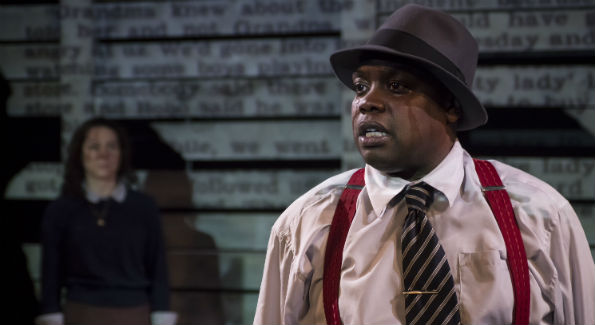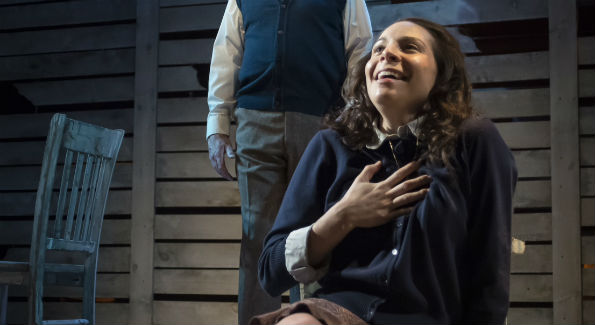The stories of Anne Frank and Emmett Tell are reimagined on stage.
By Kirsten Obadal
Racism was outlawed in this country 50 years ago with the Civil Rights Act, and yet: to forget would be to invite it back.
So goes the exceedingly powerful message of Washington playwright Janet Langhart Cohen, who’s crafted an exceptionally scripted and performed play, Anne and Emmett, based on the tragically truncated lives of Anne Frank and Emmett Till, and the imaginary conversation they might have had if they had ever met. The play takes place in Memory, a non-specific afterlife or alternate dimension, and primarily consists of retelling the lives of Till and Frank, comparing and contrasting the events in their lives. With a recorded narration by Morgan Freeman , and a score by Joshua Coyne, the play was performed last week at MetroStage in Alexandria.
Most readers will be familiar with Anne Frank’s celebrated diary, but fewer among us will remember the 1955 murder of teenager Emmett Till, who was garishly tortured and executed by vigilantes for the act of whistling his admiration of a white woman.
Janet Langhart Cohen could well afford to live the life of a politician’s wife, as her husband is the powerful former U.S. Senator and Defense Secretary Bill Cohen. Her stunning looks might be enough for some women, but she is hardly one to sit upon laurels: she has created a foundation with her husband to educate youth about tolerance and she teaches youth about the silent terrorist regime that intolerance of religious and racial hatred that dominated the 20th century.
Their foundation is called RARIA, Race and Reconciliation in America. It focuses on education and community engagement, and the play is a cornerstone of its work. Anne and Emmett is currently part of the curriculum in Arlington County Public Schools, and Langhart Cohen is discussing the possibility of having the play offered as part of police academy training in various municipalities. After a one-weekend run in early May at MetroStage in Alexandria, the play is moving to Chicago and Indianapolis, Langhart-Cohen’s hometown.
Her play premiered at the United States Holocaust Museum in Washington on the same day that would have marked Anne Frank’s 80th birthday—and the same day that a crazed neo-Nazi entered the museum, killing an African-American guard with a pistol. The message of her play — that we cannot afford to forget or be complacent about hatred and intolerance across racial and ethnic lines — was sadly and dramatically highlighted in that day’s events.
Ms. Cohen speaks from personal experience, where as a youth in the projects she was taught that to get out of “her place” would invite trouble. “My life depended upon understanding racism,” she said.
She is bringing her formidable skills with the pen to three upcoming plays: such topics as Lincoln and a slave girl, and a meditation on the politics of skin color within the African American community and how it affects relations with outsiders as well.
The MetroStage production was very well produced. Production details include a bare plywood set, with the back wall serving as a projection screen, two chairs, and two benches. It could easily be a concentration camp, or an old barn in the south. The youth are joined onstage by actors portraying Otto Frank, Anne’s father who survived the Holocaust, and Mamie Till, who devoted the rest of her life to honoring the memory of her son and highlighting the injustice of his death.
Cast members Enoch King (Emmett Till) and Ann Marie Gideon (Anne Frank) rendered convincing and moving performances. David Bryan Jackson was Otto Frank, and Roz White played the concerned mother of Emmett Till. Mr. Cohen, the former Defense Secretary, is the producer, and the play is directed by Thomas W. Jones II. Music written for the piece was added to good effect, and there is a brief narration by the actor Morgan Freeman.
Afterwards, Ms. Cohen paused for a moment to reflect on how best to achieve racial reconciliation in the aftermath of events in Ferguson and Baltimore: “We have to ‘see’ each other, see their humanity, and remember the Golden Rule: treat others as you would like to be treated. We can’t just be silent witnesses to intolerance. We can boycott, vote, educate, to end intolerance.”
“I found myself wiping away a tear on more than one occasion,” said theatergoer Ted Dettmar of Arlington. “It hit me on two levels, the sadness of the youth’s infectious enthusiasm for life, and their occasional petulance of these two ultimately doomed young people; and that hate can come in many forms, and no one can escape the responsibility of trying to stop it. If you don’t do anything to end hate, you are actually preserving it.”






